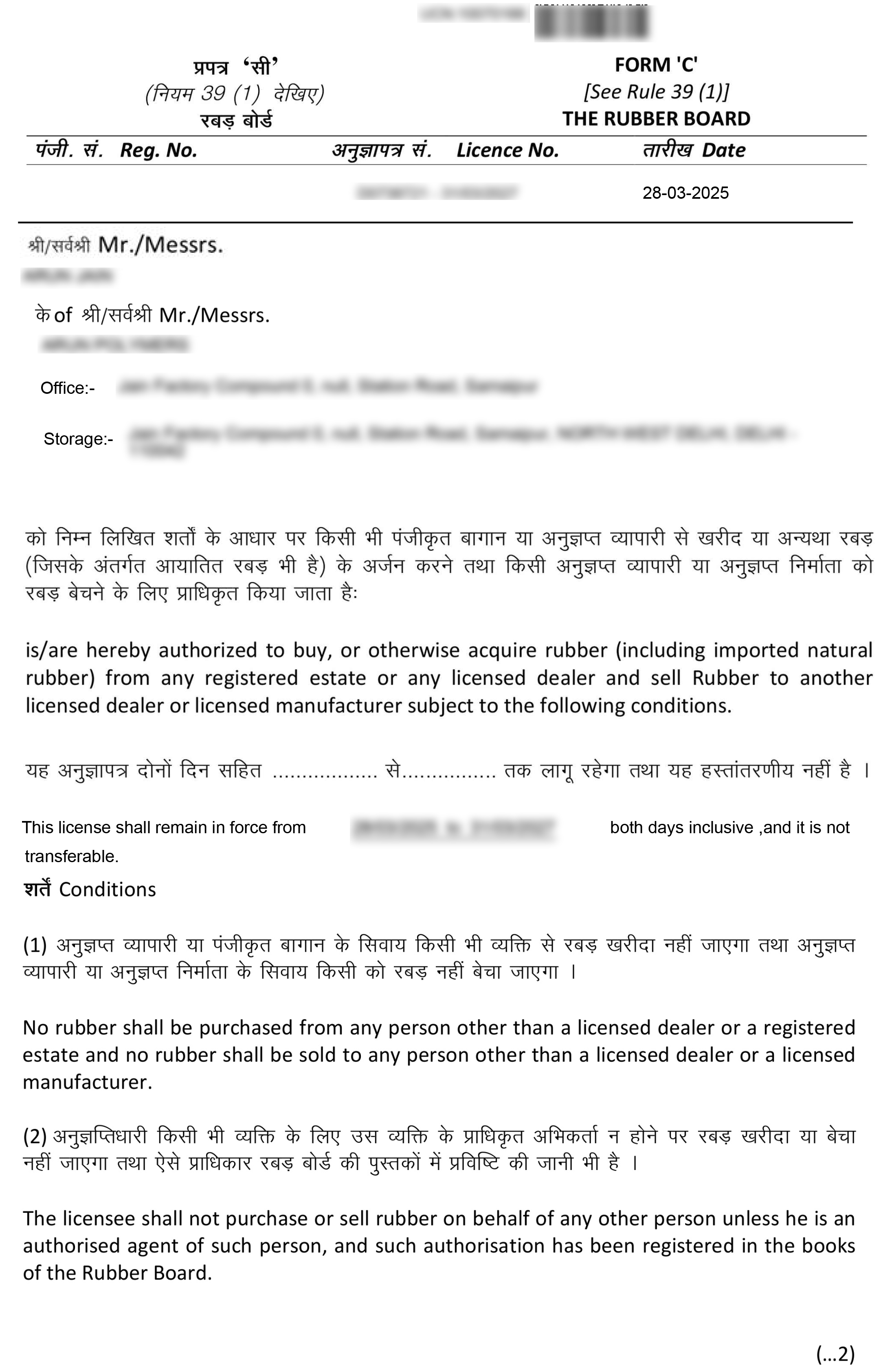The Rubber Board is an Indian government organization overseeing the rubber industry, established under the Rubber Act of 1947 and the Rubber Rules of 1955, with its headquarters in Kottayam, Kerala. Obtain your Rubber Board Registration Certification today. This certification is necessary for rubber producers, exporters, and manufacturers, ensuring compliance with regulatory standards established by the Rubber Board. Initiate the registration process now to acquire your license and receive official recognition from this regulatory authority.


10000 +
Projects Completed for Our Respected Clients.
15 +
Years Experienced Advisors in Indian Compliance.
98.9%
Project Delivery Ratio for Our Valuable Clients.
99.9%
Satisfied Customers All Over India.
Numerous industries rely on rubber, making it an important commodity. Within India, the Rubber Board regulates rubber production, processing, and trading. Any enterprises that deal with rubber need a Rubber Board Registration or License to operate within the laws and achieve efficiency. Getting a detailed overview of the Rubber Board Registration includes some important information on its importance, advantages as well as how to acquire one. Below you will find all the information to help you get your license easily.
Rubber Board Registration is a mandatory requirement for any business involved in the production, processing, or trading of rubber. The certification is important for rubber plantations, processors, and manufacturers. Getting this license makes sure the business complies with the standards and regulations set by the Rubber Board, promoting fair trade practices and quality control within the industry.

Rubber Growers: Individuals or entities owning rubber plantations
Rubber Traders: Entities engaged in the buying and selling of rubber
Rubber Processors: Businesses involved in converting raw rubber into usable products
Rubber Manufacturers: Companies producing goods using rubber as a primary material
Being a member of the Rubber Board has many benefits that can help your business grow:
An Indian Rubber Board Certification serves as an assurance that your organization is abiding by all legal guidelines laid down by the country’s government and it is necessary for avoiding legal penalties or issues.
Official recognition allows firms to penetrate broader markets since most customers go for certified products to ensure their safety and reliability.
The government gives various incentives such as money or tax cuts to any company that has been officially registered by providing high quality commodities with less expense for its operation thus making profit significantly higher.
The stamp “Rubber Board Standard” guarantees compliance with set quality norms hence enhancing its reputation among users globally.
Through Rubber Board, one can obtain support in terms of research & development which promotes both industry progression and innovation for those who have become members there.
Obtaining a Rubber Board Registration involves several steps. This guide will help you through the registration process:
Step 1: Prepare Required Documents: Before you start the application process, gather all the necessary documents. These typically include: Proof of Identity, Proof of Address, Business Registration Certificate, Land Ownership Proof, Photographs etc.
Step 2: Visit the Rubber Board Office or Website: You can either visit the nearest Rubber Board office or access their official website to start the registration process. The online registration process is convenient.
Step 3: Fill Out the Application Form: Fill out the application form with accurate business details. The details must match with the documents you are attaching with the application.
Step 4: Submit Documents: Upload or submit the required documents with your application. Double-check to ensure all documents are in order to avoid delays.
Step 5: Pay the Registration Fee: Pay the registration fee as prescribed by the Rubber Board. The fees will depend on the size and type of your business.
Step 6: Verification and Inspection: The Rubber Board will verify your application and documents. They may also conduct a physical inspection of your plantation or processing unit to ensure compliance with standards.
Step 7: Receive Registration Certificate: Once the verification and inspection are complete, you will receive your Rubber Board Registration Certificate. This certificate is proof that your business is registered and compliant with the Rubber Board's regulations.
The Rubber Board issues various licenses through its Licensing & Excise Duty (L&ED) Department, including Dealers License, Processors licenses, and Manufacturers licenses. Applications for new licenses or renewals can be conveniently processed online, with payments for Cess and License Fees accepted via net banking, credit, or debit cards.
Anyone intending to purchase, sell, or deal in rubber must apply for a Dealers License. The application requires self-attested copies of ID and address proofs issued by Government authorities, along with proof of possession of the proposed business premises. A license fee of Rs. 3540.00 for three years (@ Rs. 1180/- p.a. including GST @18%) must be remitted. Initially issued for three years, subsequent renewals are for five years.
Applicants wishing to acquire or process rubber for sale must apply for a Processors License. Applications must include self-attested ID/address proofs, proof of factory premises ownership, valid Pollution Control Board consent, valid Panchayath license, and a project report. A license fee of Rs. 3540.00 for three years (@ Rs. 1180/- p.a. including GST @18%) applies. Approval considers factors such as applicant suitability, site suitability, raw material availability, technical knowledge, technical specifications, and economic feasibility. Renewal applications should be submitted before the expiration time.
For manufacturing articles using rubber, a Manufacturers License is required, issued for a specific quantity over three years and renewable for five years thereafter. Application requirements include detailed submissions and payment of prescribed license fees, varying based on anticipated rubber requirements annually.
License fees can be paid online through payment gateways, demand drafts, or directly to the Rubber Board's account via NEFT. Detailed fee structures are provided for different types of licenses and services, ensuring compliance with current GST rates.
Changes to business premises or constitutions should be notified online with necessary documentation submitted to the Board for approval. Renewal applications should be submitted online within the specified deadlines to avoid penalties or interruptions in operations.
After obtaining your registration, it's important to maintain it by adhering to the regulations and standards set by the Rubber Board:
While obtaining and maintaining Rubber Board Registration offers many benefits, businesses may face certain challenges. Here are some common challenges and their solutions:
Possession of a valid Rubber Board license is mandatory for trading in rubber. Non-compliance may lead to legal consequences under the Rubber Act, 1947, including fines or imprisonment. For further details and application procedures, visit the official Rubber Board website or contact their offices directly.
Rubber Board Registration is a crucial step for any business involved in the rubber industry. It ensures legal compliance, opens up market opportunities, and provides access to government incentives and support. By following the steps outlined above, you can obtain and maintain your Rubber Board Registration smoothly, helping your business grow and thrive. However, getting expert help can ease the process of registration. Agile Regulatory has the tools and experts to help you get your license faster and more efficiently. Get in touch with us today and acquire your rubber license in no time.
The validity period varies depending on the type of registration. Generally, it is valid for one to five years, after which it needs to be renewed.
The registration process can take anywhere from a few weeks to a few months, depending on the completeness of the application and the time taken for verification and inspection.
Yes, small businesses, including small-scale rubber growers and processors, can apply for Rubber Board Registration. It is mandatory for all businesses involved in the rubber industry.
Yes, there is a renewal fee that needs to be paid to renew the registration. The fee amount may vary based on the type and scale of the business.
Failure to renew the registration on time can result in penalties, and your business may be deemed non-compliant. It’s important to renew it promptly to avoid any legal issues.
Yes, the Rubber Board offers an online registration process through their official website, making it convenient and quick for applicants. You can simply visit the website to apply for your license.
Proven 4-step Process: Consultation, Documentation, Submission, and Certification.
Startups to large enterprises, we deliver end-to-end solutions business compliance needs.

What our customer says about us
Fantastic support from the team. Their expertise transformed our approach, driving remarkable outcomes. A must-have partner for businesses seeking effective consulting solutions. Highly recommended.

Lavkush Sharma
KTPL Instruments
Agile Regualtory delivers exceptional solutions. Their insightful guidance streamlined our processes and boosted profitability. Highly recommended for businesses seeking expert consulting services to thrive.

Nitin Mukesh
Justrack IOT
Impressed by Agile Regulatory's expertise. Their strategic insights and practical solutions have elevated our business operations. A reliable partner for effective consulting services. Highly recommended for growth-focused businesses.

Pradeep Varma
Coaire Compressor
Extraordinary consulting services. Their insightful solutions and dedicated team reshaped our business, driving remarkable improvements. Highly recommend it for transformative results.

Bharat Bachwani
Easy Polymer
Incredible experience with Agile Regulatory. Their innovative strategies and expert advice revitalized our business model, resulting in impressive growth. Highly recommend their exceptional consulting services.

Atul Jain
Tarus International
Top-tier consulting! offered strategic solutions that revolutionized our approach. Their deep expertise and personalized guidance made a significant impact on our success. Highly recommend their services.

Paramjeet Singh
Anchor Weighing
Agile Regulatory exceeded expectations! Their tailored solutions, expertise, and proactive approach led to remarkable results. Highly recommend for businesses seeking impactful and strategic guidance.

Anshul Rathi
AM Capacitor
Outstanding service! delivered targeted solutions with professionalism and expertise. Their insights elevated our business strategies, resulting in noticeable growth. Highly recommended for exceptional consultation.

Shekhar Maurya
Imaxx Pro Aquistic